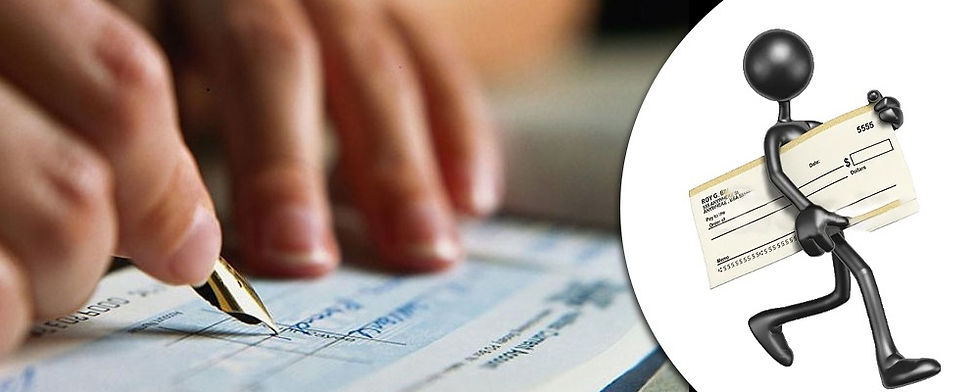How Do I Fight A Case Of Cheque Bounce Against The Government ?
- leadindia836
- Mar 6, 2023
- 3 min read
A cheque is a bill of exchange drawn upon a specified banker, payable only on demand. A person who has issued the cheque is called a ‘drawer’, while the person in whose favour the cheque is issued is called a ‘drawee’. Below mentioned are some of the characteristics of a cheque-
Should be in writing
Should be an unconditional order
The banker should be specified
The payment should be directed to a specified person
It should be payable on demand
It should be for a specific sum of money
Shall have the signature of the drawer
Reasons for cheque bounce
A cheque would be called bounced or dishonoured when it is presented before the bank for payment but is not paid because of one reason or another. Below mentioned are some of the reasons why a cheque gets bounced-
The signature is not matched
There is overwriting
The cheque was presented after a period of three months has passed, i.e.after the expiry of the cheque.
The account was closed.
There is insufficient balance in the account
The payment was stopped by the account holder.
The opening balance is insufficient
The words and figures mentioned on the cheque are not similar.
If the cheque was issued by a company, it does not bear the seal of the company
Death of the customer
Insolvency of the customer.
In a situation where the cheque was issued against the rules of the trust.
If the cheque is presented at the wrong branch
In addition to the above-mentioned reasons, there are a few other reasons why a cheque is dishonoured.
Legal provisions available for cheque bounce in India
Section 138 of the Negotiable Instruments Act, of 1881 provides for cheque bounces in India. The Act provides that cheque bounce is a criminal offence and is punishable with imprisonment of two years or a fine equal to twice the amount mentioned on the cheque, or both.
Section 141 of the NI Act provides that if an offence is committed under Section 138 by a company, then every individual involved in the discharge of liability will be responsible for the offence of cheque bounce.
How to file a cheque bounce case?
A cheque bounce is a criminal offence under Section 138 of the Negotiable Instruments Act, of 1881. If you are a victim of cheque dishonour, it is advised that you seek the advice of cheque cheque bounce lawyers hyderabad or cheque bounce lawyers Chennai or your own city.
The following actions could be taken by the payee of a cheque-
In case of a cheque bounce, the payee, if he knows that the cheque would not be dishonoured next time, can resubmit another cheque within a period of 3 months from the date of issue.
Another option is that the payee can send a legal notice to the defaulter within 30 days of receiving the cheque return memo. All the relevant facts of the case including the nature of the transaction, the amount, the date of deposit, the subsequent date of dishonour, etc should be clearly mentioned in the notice. Such notice should be sent with the advice of an experienced cheque bounce lawyers Ahmedabad.
In case no satisfactory reply has been received or no repayment has been made within 30 days of receiving the notice, then in such a case, the payee has the right to file a criminal complaint under Section 138 of the Act. this complaint shall be registered in the magistrate’s court within a month of the expiry of the notice period.
After receiving the affidavit and the relevant documents, the court will issue a summon and shall hear the matter. In case found guilty, the defaulter shall be punished with a prison term of 2 years or a fine which could be twice as the amount of the cheque.
Conclusion
From the above discussion, it could be inferred that a cheque bounce is a crime as per the Negotiable Instruments Act and proper action could be taken against the wrongdoer if all the attempts to repay have been rendered useless.
Similarly, if the wrongdoer is the Government, in such a situation, one can initiate legal proceedings. It is, however, advised to seek the assistance of experienced advocates. In case you wish to seek legal advice online or talk to a lawyer, you may contact us at Lead India.
Visit Us: - https://www.leadindia.law
Call Us: - +91-8800788535
Email: care@leadindia.law
Facebook: - https://www.facebook.com/leadindialaw
LinkedIn: - https://www.linkedin.com/company/76353439
Twitter: - https://twitter.com/leadindialaw
Pinterest:- https://in.pinterest.com/lawleadindia




Comments